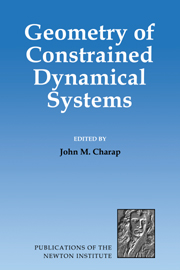Book contents
- Frontmatter
- Contents
- The network
- Preface
- The constraint algebra of higher dimensional Chern-Simons theories
- Nonrelativistic Chern-Simons vortices from the constrained Hamiltonian formalism
- Classical solutions of gravitating Chern-Simons electrodynamics
- Exponentially localised instantons in a hierarchy of Higgs models
- Obstructions to ganging WZ terms: a symplectic curiosity
- Global aspects of symmetries in sigma models with torsion
- Canonical structure of the non-linear σ-model in a polynomial formulation
- A manifestly gauge-invariant approach to quantum theories of gauge fields
- On the Hamiltonian formulation of higher dimensional Chern-Simons gravity
- An Example of Loop Quantization
- Gauge fixing in constrained systems
- Light-cone formulation of gauge theories
- Hamiltonian constraints and Dirac observables
- Gauging kinematical and internal symmetry groups for extended systems
- On the harmonic interaction of three relativistic point particles
- Non existence of static multi-black-hole solutions in 2+1 dimensions
- Spherically symmetric gravity and the notion of time in general relativity
- Canonical decomposition of Belinskii-Zakharov one-soliton solutions
- Hamiltonian reduction and the R-matrix of the Calogero model
- Intrinsic approach to the Legendre transformation in super-mechanics
- Field-antifield description of anomalous theories
- Transfer matrix quantization of general relativity, and the problem of time
- The W3-particle
- Pure geometrical approach to singular Lagrangians with higher derivatives
- Dirac versus reduced phase space quantization
- Classical and quantum aspects of degenerate metric fields
- BRST-antibracket cohomology in 2d conformal gravity
- Quantisation of 2 + 1 gravity for g = 1 and g = 2
- Geometry and dynamics with time-dependent constraints
- Collective coordinates and BRST transformations or Gauge theories without gauge fields
- Geometry of fermionic constraints in superstring theories
- BRST and new superstring states
- Generalized canonical quantization of gauge theories with polarized second–class constraints
- Radiation field on superspace
- Participants
On the harmonic interaction of three relativistic point particles
Published online by Cambridge University Press: 05 November 2011
- Frontmatter
- Contents
- The network
- Preface
- The constraint algebra of higher dimensional Chern-Simons theories
- Nonrelativistic Chern-Simons vortices from the constrained Hamiltonian formalism
- Classical solutions of gravitating Chern-Simons electrodynamics
- Exponentially localised instantons in a hierarchy of Higgs models
- Obstructions to ganging WZ terms: a symplectic curiosity
- Global aspects of symmetries in sigma models with torsion
- Canonical structure of the non-linear σ-model in a polynomial formulation
- A manifestly gauge-invariant approach to quantum theories of gauge fields
- On the Hamiltonian formulation of higher dimensional Chern-Simons gravity
- An Example of Loop Quantization
- Gauge fixing in constrained systems
- Light-cone formulation of gauge theories
- Hamiltonian constraints and Dirac observables
- Gauging kinematical and internal symmetry groups for extended systems
- On the harmonic interaction of three relativistic point particles
- Non existence of static multi-black-hole solutions in 2+1 dimensions
- Spherically symmetric gravity and the notion of time in general relativity
- Canonical decomposition of Belinskii-Zakharov one-soliton solutions
- Hamiltonian reduction and the R-matrix of the Calogero model
- Intrinsic approach to the Legendre transformation in super-mechanics
- Field-antifield description of anomalous theories
- Transfer matrix quantization of general relativity, and the problem of time
- The W3-particle
- Pure geometrical approach to singular Lagrangians with higher derivatives
- Dirac versus reduced phase space quantization
- Classical and quantum aspects of degenerate metric fields
- BRST-antibracket cohomology in 2d conformal gravity
- Quantisation of 2 + 1 gravity for g = 1 and g = 2
- Geometry and dynamics with time-dependent constraints
- Collective coordinates and BRST transformations or Gauge theories without gauge fields
- Geometry of fermionic constraints in superstring theories
- BRST and new superstring states
- Generalized canonical quantization of gauge theories with polarized second–class constraints
- Radiation field on superspace
- Participants
Summary
Introduction
The problem of N mutually interacting particles in direct interaction has received much attention in recent years [1].
The problem can be stated in the following form: to find N mass constraints which satisfy the following requirements
i) they must be first class constraints in the sense of Dirac [2],[3]
ii) they must have the cluster decomposition property (separability), defined as the possibility of splitting the system in subsystems (clusters) by switching off some of the interactions [5],[6],[7] and [8].
The two requirements (i) and (ii) are difficult to satisfy for more than two bodies. In particular the cluster decomposition property or separability requires the presence of genuine N body forces [9],[10] and [11].
In the present paper we start an analysis of the spinless case, with harmonic interaction. We have chosen this simplified case, since the classical solution is well known, in order to have some insight into the difficulties of the problem. A separable model for three fermions has been proposed in ref.[12].
We will show that it is possible to give the form of the first class constraints in the general case, but defined in implicit form. In our intentions this analysis would be the starting point of a relativistic theory of small vibrations about a stable configuration of some general potential.
In a particular configuration, when two over three of the coupling constants are equal, there is a great simplification, particularly if one uses a suitable gauge fixing. The analysis of this case is in progress.
- Type
- Chapter
- Information
- Geometry of Constrained Dynamical Systems , pp. 141 - 149Publisher: Cambridge University PressPrint publication year: 1995

